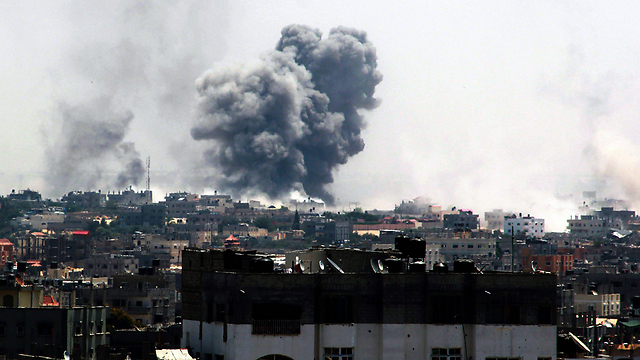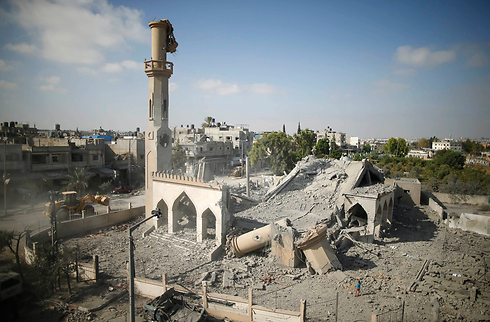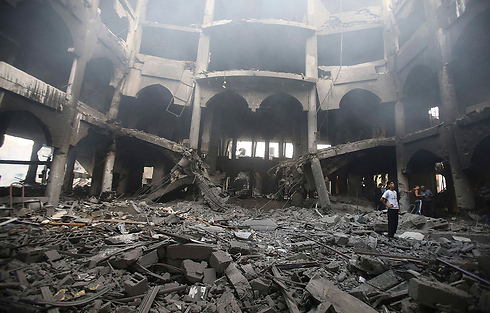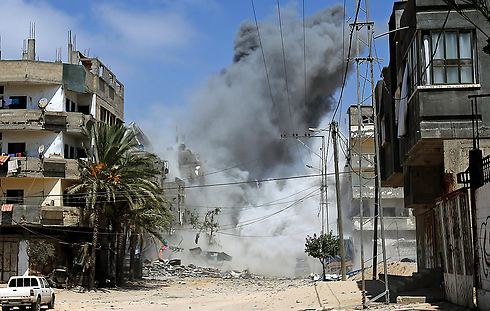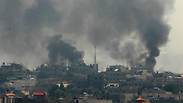
IDF extends criminal investigations into Protective Edge
In light of the UN report to be submitted next week, IDF advocate general opens three more probes into alleged unsanctioned use of weapons by IDF soldiers during Gaza war last summer.
The international investigative committee examining the events of Operation Protective Edge is expected to submit its report next week to the United Nations Human Rights Council (UNHRC) in Geneva, as well as to Israel and the Palestinians.
Efroni ordered the Military Police Investigative Division to look into three additional incidents which raise suspicions of illegal use of weapons by Israeli soldiers against Palestinians.
The most serious of the three incidents involves the death of nine Palestinians who were sitting at a café on the Khan Younis beach on July 9, 2014, and were killed by Israeli Air Force bombs.
The IDF said that a military investigative team that examined the incident following complaints from pro-Palestinian groups has delivered its findings to the military advocate general. The findings reveal that the attack was carried out based on reasonable suspicion, but not in accordance with IDF's rules of engagement.
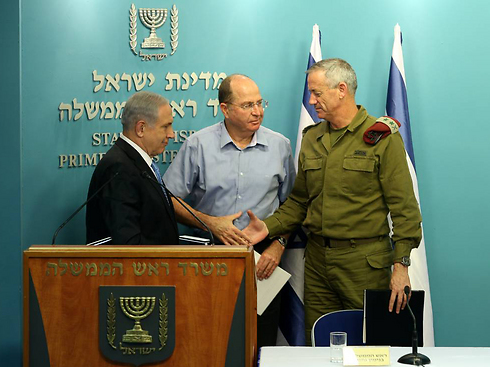
Another serious incident involves a suspected unsanctioned firing by IDF soldiers at a Palestinian clinic.
Captain Dima Levitas, company commander of the 7th Armored Brigade, was killed by a Palestinian sniper on July 22, along with Captain Natan Cohen. Dima's fellow soldiers, who were unable to attend his funeral because of continued fighting in the Gaza Strip, decided, as a tribute, to fire tank shells at the Palestinian clinic from which the sniper fire originated. His comrades-in-arms said the barrage was a salute in memory of their friend.
Levitas's battalion commander Lt.-Col. N.'s testimony about the incident was published in an IDF magazine: "We decided to fire a barrage of shells at the place where Dima lost his life, but life has a rhythm of its own, and exactly a second later they fired back at us."
Another officer from the battalion said the shelling was "closure, and not vengeance." Nonetheless, the IDF advocate general viewed the incident differently, and it is likely the battalion commander will be investigated as a suspect.
The third investigation concerns the beating of a Palestinian detainee by IDF soldiers.
No decision yet on 'Black Friday'
The IDF decided to close a criminal investigation, without filing criminal charges, into the deaths of four children on the fisherman's beach near the port of Gaza, known as the police marine compound.
The army says that an examination of photos and videos documenting the attack by the IDF as well as Palestinian media, along with the refusal of a Palestinian eyewitness to be questioned by the IDF, have led to the decision to close the case, among other things.
The army also said that a container loaded with Hamas military equipment was also bombed in that attack. In addition, the army claimed the children who were killed were not identified as children by the troops, and that warning fire was given prior to the attack.
The IDF advocate general also decided not to open a criminal investigation into the incident in which 15 Palestinians were killed in the attack on the Al-Salam building in Gaza City, where an Islamic Jihad commander was hiding.
In addition, it was decided not to open a criminal investigation into the attack on a Hamas military operations room in Khan Younis targeting two Hamas fighters, in which eight members of the Al-Najar family were killed. In this incident, the IDF argued, there was deliberately no prior warning given to civilians, because such a warning could have hindered the success of the mission.
"So far, claims regarding 190 incidents have been transferred to the military investigative team, 105 of which have already been investigated and referred to the IDF advocate general for final decision," an IDF statement stated.
"Of these incidents, the military advocate general decided to open a criminal investigation into seven of them. Some of these investigations are ongoing, some have been completed and their findings are being examined by the military advocate general, and a decision has already been taken with regard to some of the incidents.
"Regarding 19 additional incidents, the military advocate general decided to end the procedure without opening a criminal investigation. Dozens of other incidents are still under various stages of examination and their findings will be transferred to the military advocate general later on. Moreover, following claims that established a reasonable suspicion of a criminal offense, the military advocate general has so far ordered to open criminal investigations into15 incidents, two of which have been closed."
So far, the military advocate general has decided to serve a criminal indictment on one case in which Golani soldiers looted thousands of shekels from a Palestinian home in Shuja'iyya. Moreover, since the end of the war, it was decided to open criminal investigations, which are still ongoing, into a series of incidents in which dozens of Palestinian civilians were killed by IDF fire.
One of the most dramatic decisions yet to be taken by the advocate general involves whether or not the officers and fighters of the Givati Brigade will be investigated over the outcome of their attempt to locate 2nd.-Lt. Hadar Goldin, in what has come to be known as the events of Black Friday in Rafah, which led to the death of at least 40 Palestinians.
The prevailing view among senior IDF officers is that the military advocate general will refrain from opening a criminal investigation into the incident, if only because of public outcry of the last six months and criticism within the military against such a possibility.
The operational investigations found gaps concerning the conduct of the war and the choice to send forces to locate terror tunnels during a cease-fire, but they did not find cases of shooting at civilian targets.
Nonetheless, the advocate general over the last year has said that it is precisely the military advocate general's criminal investigations, as well as a thorough examination of inspection teams that were established, that will constitute a significant answer to international law claims that will arise against Israel in tribunals such as the The United Nations Fact Finding Mission on the 2014 Israel–Gaza conflict.
Officially, the thick report of the Schabas Committee will be presented to the UN Human Rights Council in Geneva only on June 29, but the commission intends to submit it to both sides in the coming days. Israeli officials predict that as soon as the Palestinians get it they will publish its contents in order to condemn Israel.
Israel boycotted the Schabas Committee, did not participate with it, and did not allow it to enter Israel. Even so, Israeli civilians such as Haim Yelin, Gila Turgeman, the mother of a 4-year-old boy killed by a mortar from Gaza, and Gadi Yarkoni , turned to the committee and testified before it. Even Israeli associations and human rights groups sent the Commission documents that show the Israeli side of the conflict.
Israeli officials say that despite the expected charges in the report, Israel's in a better position than it was during the Goldstone report as it will be easy to argue that it was written under the influence of the anti-Israeli Schabas.
The advocate general said that "credible investigations are not only a legal and moral compass, but a protective tool for officers to be 'clean' of any suspicion, and to avoid international arrest warrants in Europe, as was the case after the Marmara incident and Operation Cast Lead.










